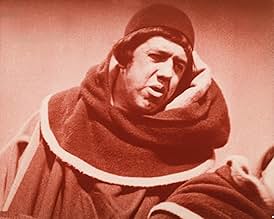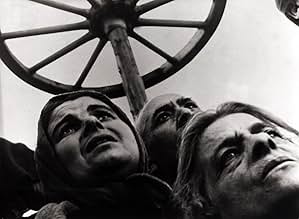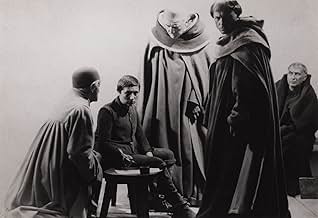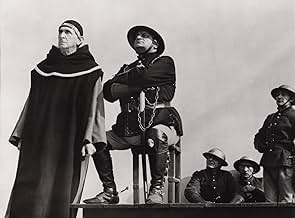CALIFICACIÓN DE IMDb
8.1/10
66 k
TU CALIFICACIÓN
La joven francesa Juana de Arco, salvadora de la patria frente a los ingleses, y que declara sentirse inspirada directamente por Dios, se enfrenta a su procesamiento y a una posible condena ... Leer todoLa joven francesa Juana de Arco, salvadora de la patria frente a los ingleses, y que declara sentirse inspirada directamente por Dios, se enfrenta a su procesamiento y a una posible condena a muerte.La joven francesa Juana de Arco, salvadora de la patria frente a los ingleses, y que declara sentirse inspirada directamente por Dios, se enfrenta a su procesamiento y a una posible condena a muerte.
- Dirección
- Guionistas
- Elenco
- Premios
- 4 premios ganados y 1 nominación en total
Maria Falconetti
- Jeanne d'Arc
- (as Mlle Renée Falconetti)
Eugene Silvain
- Évêque Pierre Cauchon (Bishop Pierre Cauchon)
- (as Eugène Silvain)
Louis Ravet
- Jean Beaupère
- (as Ravet)
Armand Lurville
- Juge (Judge)
- (as André Lurville)
Jean Aymé
- Juge (Judge)
- (sin créditos)
Camille Bardou
- Richard Beauchamp, 13th Earl of Warwick
- (sin créditos)
Gilbert Dacheux
- Juge (Judge)
- (sin créditos)
Gilbert Dalleu
- Jean Lemaître
- (sin créditos)
Paul Delauzac
- Martin Ladvenu
- (sin créditos)
Dimitri Dimitriev
- Juge (Judge)
- (sin créditos)
- Dirección
- Guionistas
- Todo el elenco y el equipo
- Producción, taquilla y más en IMDbPro
Resumen
Reviewers say 'The Passion of Joan of Arc' is celebrated for its innovative close-ups, emotional intensity, and pioneering silent film techniques. Renée Falconetti's performance is lauded for its subtlety and expressiveness. The film delves into themes of faith, power, and human spirit, contrasting Joan's purity with her accusers' corruption. Critics praise Dreyer's meticulous direction and the film's historical significance. Some find the silent format and close-ups challenging, yet it remains a landmark in cinematic achievement.
Opiniones destacadas
What can one say about this work of art that has not been said many times before by those far better qualified to explain both it's importance and place as cinema and art? I shall not comment on the greatness of the film's technical achievements; the stunning cinematography, the production design, the brilliance of the screenplay based on actual transcripts from the trial, or the perfection of Mr. Dreyer's direction. The performance of Falconetti as Jeanne d' Arc has a profundity and depth far beyond my ability to illuminate. I suppose the best I can hope to do is to share my feelings, however inadequately expressed, of the effect it had on me. To say that it may be the greatest film ever made is to sound both obvious and trite. That a work of such beauty and simplicity, made seventy-six years ago can still have the power to move audiences in an era of multi-million dollar, hi-tech, bombastic over-wrought cinematic drivel is in itself a testament to the vision and genius of Carl Theodor Dreyer, Maria Falconetti and their collaborators. It is nourishment for those that hunger for something more in cinema, a feast for the soul. It is a reminder that film can indeed be art, and this film like all great works of art, lifts and transports us from the routine of our work-a-day lives to enable us, if only for a moment to experience the sublime. When viewing it we look at it as looking in a mirror. That is to say we look into ourselves. We question ourselves as to our own beliefs, or the lack thereof and the strength of spirit that enables an individual to endure the unendurable. Viewing it is a profound experience the nature of which for myself is transcendent rather than religious, because I am not in the least a religious person. Transcendent because it evokes emotions and thoughts that I cannot wholly account for, or adequately explain.
"La Passion of Jeanne d'Arc" is stark, radiant, exalted, simple, (but never simplistic), and ultimately sublime. The rest is silence.
"La Passion of Jeanne d'Arc" is stark, radiant, exalted, simple, (but never simplistic), and ultimately sublime. The rest is silence.
10zeph-3
I saw this film for the very first time last week and was so tremendously captivated by it that I needed to share this rapture. The innovative camera-angles, the close-ups revealing pain and spirituality. It elevates the human condition and the Art of film. I would love to be able to go on into the whys or hows or technicalities. But my words couldn't do the film justice for the imagery still overwhelms me.
10judokid
I saw this a few months ago on the big screen, just after Nosferatu, another silent classic. Both showings were supported by a live organ play, which has been composed directly for the movie, and which suited perfectly. I had seen Nosferatu before, but i didn´t know anything about `Jeanne`, and so i was in no way prepared for this overwhelming, soul-rapturing experience.
My eyes were immediately glued to the screen. Unfortunately i had missed the first minutes, so it started for me with the first (?) court scene. The camera wandered through the faces of the court members, circled and focussed on Jeanne´s face. So beautiful, naked, strong and defenseless! I could rave on the technical perfection of this film, it´s clever editing, innovative and gorgeous cinematography, proper historical settings and pure storytelling. Carl Theodor Dreyer created a masterpiece. But the most outstanding feature of this silent are the performances; Maria Falconetti delivers simply the best performance of all times, and i can´t remember of any ´corny` overacting, which distracts most silent movies from the modern viewer, even the accepted classics. `La passion de Jeanne d´Arc´ is purest cinematic art, timeless in every sense.
My eyes were immediately glued to the screen. Unfortunately i had missed the first minutes, so it started for me with the first (?) court scene. The camera wandered through the faces of the court members, circled and focussed on Jeanne´s face. So beautiful, naked, strong and defenseless! I could rave on the technical perfection of this film, it´s clever editing, innovative and gorgeous cinematography, proper historical settings and pure storytelling. Carl Theodor Dreyer created a masterpiece. But the most outstanding feature of this silent are the performances; Maria Falconetti delivers simply the best performance of all times, and i can´t remember of any ´corny` overacting, which distracts most silent movies from the modern viewer, even the accepted classics. `La passion de Jeanne d´Arc´ is purest cinematic art, timeless in every sense.
A certain amount of credit must surely be paid to the director for the genius of 'La Passion de Jeanne d'Arc.' The daring camera angles, use of incessant close-ups and peculiar authenticity all may be attributed to Carl Th. Dryer. However, Renee Maria Falconetti is the reason this film indeed surpasses all attempts at reaching the Platonic form of brilliance. Her performance is breathtaking by all accounts. One can not help but remain mesmerized by her expressions. Yes Dryer's gift to us of so many wonderful close shots of Falconetti should be acknowledged. He must be praised for his relentless filming of scenes to produce the desired result. Yet to imagine anyone else in this timeless role (such as Lillian Gish who was said to have been considered) is to envision a less than perfect film. Unimpeded by the silent medium in which she worked, Falconetti's mere tilt of the head or gentle glance pierce the soul of the viewer. We see her speak in Jeanne's native tongue. We see her compelling portrayal of the anguish which the saint most certainly endured. It is almost as if we are watching what the director said he had found; the martyr's reincarnation! This actress presents to us her raw beauty unmarred by powders or makeup - thanks to a decision of Dryer. How bitter-sweet the fact that we have this once thought to be lost silent film and yet can not help now but to long for more Falconetti. And so we return to 'La Passion de Jeanne d'Arc' and with each of many tears and inaudible sighs marvel at the staggering accomplishment which is Renee Maria Falconetti's Jeanne.
This film almost leads one to believe that sound betrays the emotion the eyes capture. Just as the blind develop hearing far better than the average, the deaf develop a keen sense of sight. I am convinced that a lack of dialogue forces us to read the language of the face and body, a verbage unmatched in beauty and nuance. Though the accompanying musical piece (be careful not to identify it as a score), so deliciously inspired by the film, enhances the visual playground; it is the actors' faces that comprise this tour de force. Ms. Falconetti shifts from worry and doubt to unabashed conviction in a single shot, giving the viewer the luck of seeing one's thoughts in progress. She needs no response to the interrogation, it's all in her face. Renee is not superficially beautiful and the lack of make-up only reinforces how bare Joan is, but it is the uncanny ability of an incomparable stage actor to be a window into the soul that makes her so stunning, for the soul we see is one we only wish to attain for ourselves. The Church sees what we see, and they respond just as clearly to her unspoken protest with vehement pomp. The cinematography is so astounding for its time no comment could ever do it justice. Though many comments can be made, and are, surrounding the inspiration and detail for the set, it is at its core an incredible gift from Dreyer to the actors meant to inspire. It plays little part in the film, but to pull an inconceivable last drop of reality from the actors. A testament I can imagine will never be matched to the incredible power of silence.
¿Sabías que…?
- TriviaAfter completing the original cut of the film, director Carl Theodor Dreyer learned that the entire master print had been destroyed accidentally. With no ability to reshoot, Dreyer re-edited the entire film from footage he had originally rejected.
- ErroresIn the 15th century, a priest can be seen wearing a Jesuit robe. The Jesuit order was founded in the 16th century.
- Citas
Jeanne d'Arc: Dear God, I accept my death gladly but do not let me suffer too long. Will I be with You tonight in Paradise?
- Versiones alternativasIn the 1930s, a one-hour synchronized sound version was reissued under the name "The Immortal Saint" using David Ross as a narrator to replace intertitles.
- ConexionesEdited into From Camille to Joan of Arc (1961)
Selecciones populares
Inicia sesión para calificar y agrega a la lista de videos para obtener recomendaciones personalizadas
- How long is The Passion of Joan of Arc?Con tecnología de Alexa
Detalles
- Fecha de lanzamiento
- País de origen
- Idiomas
- También se conoce como
- The Passion of Joan of Arc
- Locaciones de filmación
- Productora
- Ver más créditos de la compañía en IMDbPro
Taquilla
- Total en EE. UU. y Canadá
- USD 21,877
- Fin de semana de estreno en EE. UU. y Canadá
- USD 6,408
- 26 nov 2017
- Total a nivel mundial
- USD 22,731
- Tiempo de ejecución1 hora 50 minutos
- Color
- Mezcla de sonido
- Relación de aspecto
- 1.33 : 1
Contribuir a esta página
Sugiere una edición o agrega el contenido que falta

Principales brechas de datos
By what name was La pasión de Juana de Arco (1928) officially released in India in English?
Responda





























